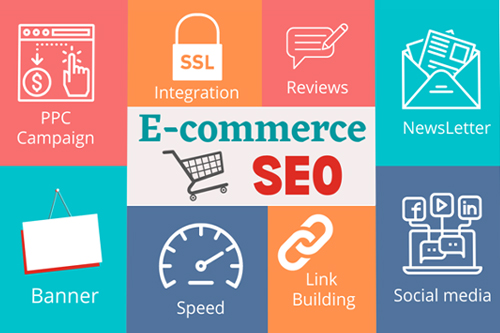In today’s digital-first world, ecommerce businesses face fierce competition. The key to standing out and driving traffic to your online store lies in effective Search Engine Optimization (SEO). With millions of products available at the click of a button, ecommerce SEO can be a game-changer in helping your store gain visibility on search engine results pages (SERPs) and attract potential customers. In this comprehensive guide, we’ll explore the strategies and best practices to optimize your ecommerce store for SEO, ensuring higher rankings, more traffic, and increased sales.
What is Ecommerce SEO?
Ecommerce SEO refers to the process of optimizing an online store’s website to make it more visible in organic (non-paid) search engine results. This involves various techniques, including keyword research, on-page SEO, technical SEO, content marketing, and link building, all aimed at driving targeted traffic to your product pages.
Effective ecommerce SEO ensures that when potential customers search for products related to what you sell, your store appears at the top of search results, increasing your chances of converting visitors into buyers.
Why Ecommerce SEO is Important
- Increased Organic Traffic: Organic traffic refers to visitors who land on your website through search engines like Google. By optimizing your website for SEO, you increase the chances of ranking higher on search engines, which leads to more visitors without paying for ads.
- Better User Experience: SEO isn’t just about keywords and links; it also involves improving your website’s usability, speed, and overall user experience (UX). A fast, well-structured site with relevant content helps visitors find what they’re looking for quickly, which improves engagement and reduces bounce rates.
- Higher Conversion Rates: The better optimized your site is, the easier it is for potential customers to find what they need. SEO helps connect search intent with your products, making it easier for the right audience to land on the right product pages.
- Cost-Effective Marketing: Unlike paid advertising, which requires continuous investment, SEO is a long-term strategy. Once your pages rank highly, they can continue to attract traffic without additional costs.
Key Ecommerce SEO Strategies
1. Conduct Thorough Keyword Research
Keyword research is the cornerstone of any successful SEO strategy. For ecommerce, this means identifying the search terms potential customers are using when looking for products like yours. These keywords will form the basis of your optimization efforts.
How to Perform Keyword Research:
- Use SEO tools: Tools like Google Keyword Planner, Ahrefs, and SEMrush help you discover relevant keywords, search volumes, and competition levels.
- Long-tail keywords: Focus on long-tail keywords—specific, low-competition phrases that have high buying intent. For example, instead of targeting “running shoes,” you could target “best running shoes for flat feet.”
- Analyze competitors: Look at what keywords your competitors are ranking for, and consider incorporating similar terms into your SEO strategy.
2. Optimize Product Pages for SEO
Your product pages are the most important part of your ecommerce site, and they need to be optimized to rank well in search results.
Key Elements to Optimize:
- Title Tags: Each product page should have a unique, descriptive title tag that includes the primary keyword. For example: “Men’s Blue Running Shoes – Lightweight & Breathable.”
- Meta Descriptions: Write compelling meta descriptions that encourage users to click on your page. Include keywords but keep it natural.
- Product Descriptions: Avoid using manufacturer descriptions. Instead, create unique, detailed descriptions that highlight the benefits and features of your product. Incorporate relevant keywords but prioritize readability.
- Images: Use high-quality images and optimize them by adding alt text that describes the product, which helps both users and search engines understand the image content.
- URL Structure: Use clear, keyword-rich URLs. For example, instead of
www.store.com/product123, usewww.store.com/mens-blue-running-shoes. - Internal Linking: Link to related products or categories to help users navigate your site and improve your internal link structure.
3. Implement Technical SEO Best Practices
Technical SEO ensures that search engines can easily crawl and index your ecommerce site. Here are some technical elements to focus on:
- Site Speed: A slow-loading site can lead to high bounce rates and poor user experience. Use tools like Google PageSpeed Insights to analyze your site’s speed and make necessary improvements. Compress images, leverage browser caching, and use a Content Delivery Network (CDN) to speed up your site.
- Mobile Optimization: With most users browsing from mobile devices, having a mobile-friendly website is crucial. Google’s mobile-first indexing means that the mobile version of your site is considered the primary version. Ensure that your site is responsive and offers a seamless experience on all devices.
- Secure Website (HTTPS): Security is important for both users and search engines. Make sure your website has an SSL certificate (HTTPS), as this boosts trust and can positively impact rankings.
- XML Sitemap: Create and submit an XML sitemap to Google Search Console. This helps search engines understand your site structure and index your pages properly.
- Structured Data (Schema Markup): Implement schema markup (product schema, review schema, etc.) to enhance how your product pages appear in search results. This can lead to rich snippets, such as star ratings, price, and availability, making your listings more attractive.
4. Content Marketing for Ecommerce
Content marketing is an excellent way to attract more visitors and engage your audience. By creating valuable, informative content, you can improve your rankings and build trust with potential customers.
Types of Content to Create:
- Blog Posts: Write blog posts that answer customer questions, provide buying guides, or showcase product use cases. For example, “The Best Running Shoes for Beginners” or “How to Care for Leather Boots.”
- Product Comparisons: Create content that compares your products with others in the market, highlighting why yours is the best choice.
- User-Generated Content: Encourage reviews, testimonials, and photos from your customers. User-generated content is valuable for SEO and helps build trust.
5. Build Backlinks
Backlinks are one of the most important ranking factors in SEO. Backlinks are links from other websites to your site, signaling to search engines that your content is valuable and authoritative.
How to Build Backlinks:
- Reach out to bloggers and influencers: Collaborate with bloggers and influencers in your niche. They can link to your products in their content, driving traffic and building authority.
- Guest Posting: Write guest posts for other websites with a link back to your ecommerce store.
- Product Reviews: Send your products to bloggers or influencers for reviews and backlinks.
6. Monitor and Analyze SEO Performance
Finally, it’s important to track your SEO efforts to understand what’s working and what needs improvement. Use tools like Google Analytics and Google Search Console to monitor organic traffic, keyword rankings, and user behavior on your site.
Regularly review key metrics, such as:
- Organic traffic growth
- Click-through rates (CTR)
- Conversion rates
- Bounce rates
Conclusion
Ecommerce SEO is essential for increasing visibility, driving traffic, and growing sales. By implementing the right strategies—conducting keyword research, optimizing product pages, improving technical SEO, creating engaging content, and building backlinks—you can improve your ecommerce store’s ranking on search engines and attract potential customers.
Remember that SEO is a long-term investment. Consistency, optimization, and staying up-to-date with search engine algorithm changes will help your online store remain competitive in an ever-evolving market.
By applying Experience, Expertise, Authoritativeness, and Trustworthiness (EEAT) principles, you ensure that your ecommerce site not only ranks well but also provides value and builds trust with your audience.


